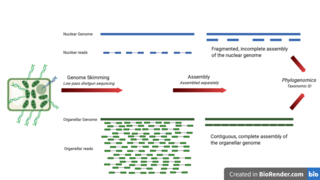
A DNA sequencer is a scientific instrument used to automate the DNA sequencing process. Given a sample of DNA, a DNA sequencer is used to determine the order of the four bases: G (guanine), C (cytosine), A (adenine) and T (thymine). This is then reported as a text string, called a read. Some DNA sequencers can be also considered optical instruments as they analyze light signals originating from fluorochromes attached to nucleotides.

BGI Group, formerly Beijing Genomics Institute, is a Chinese genomics company with headquarters in Yantian, Shenzhen. The company was originally formed in 1999 as a genetics research center to participate in the Human Genome Project. It also sequences the genomes of other animals, plants and microorganisms.

DNA sequencing is the process of determining the nucleic acid sequence – the order of nucleotides in DNA. It includes any method or technology that is used to determine the order of the four bases: adenine, guanine, cytosine, and thymine. The advent of rapid DNA sequencing methods has greatly accelerated biological and medical research and discovery.

George McDonald Church is an American geneticist, molecular engineer, chemist, serial entrepreneur, and pioneer in personal genomics and synthetic biology. He is the Robert Winthrop Professor of Genetics at Harvard Medical School, Professor of Health Sciences and Technology at Harvard University and Massachusetts Institute of Technology, and a founding member of the Wyss Institute for Biologically Inspired Engineering at Harvard University.
Illumina, Inc. is an American biotechnology company, headquartered in San Diego, California, and it serves more than 155 countries. Incorporated on April 1, 1998, Illumina develops, manufactures, and markets integrated systems for the analysis of genetic variation and biological function. The company provides a line of products and services that serves the sequencing, genotyping and gene expression, and proteomics markets.

Mostafa Ronaghi is an Iranian molecular biologist, specializing in DNA sequencing methodology. He earned his Ph.D. from the Royal Institute of Technology in Sweden in 1998.
Personal genomics or consumer genetics is the branch of genomics concerned with the sequencing, analysis and interpretation of the genome of an individual. The genotyping stage employs different techniques, including single-nucleotide polymorphism (SNP) analysis chips, or partial or full genome sequencing. Once the genotypes are known, the individual's variations can be compared with the published literature to determine likelihood of trait expression, ancestry inference and disease risk.

Whole genome sequencing (WGS), also known as full genome sequencing, complete genome sequencing, or entire genome sequencing, is the process of determining the entirety, or nearly the entirety, of the DNA sequence of an organism's genome at a single time. This entails sequencing all of an organism's chromosomal DNA as well as DNA contained in the mitochondria and, for plants, in the chloroplast.
Complete Genomics is a life sciences company that has developed and commercialized a DNA sequencing platform for human genome sequencing and analysis. This solution combines the company's proprietary human genome sequencing technology with its informatics and data management software to provide finished variant reports and assemblies at Complete Genomics’ commercial genome center in Mountain View, California.
The 1000 Plant Transcriptomes Initiative (1KP) was an international research effort to establish the most detailed catalogue of genetic variation in plants. It was announced in 2008 and headed by Gane Ka-Shu Wong and Michael Deyholos of the University of Alberta. The project successfully sequenced the transcriptomes of 1000 different plant species by 2014; its final capstone products were published in 2019.

Exome sequencing, also known as whole exome sequencing (WES), is a genomic technique for sequencing all of the protein-coding regions of genes in a genome. It consists of two steps: the first step is to select only the subset of DNA that encodes proteins. These regions are known as exons—humans have about 180,000 exons, constituting about 1% of the human genome, or approximately 30 million base pairs. The second step is to sequence the exonic DNA using any high-throughput DNA sequencing technology.
Massive parallel sequencing or massively parallel sequencing is any of several high-throughput approaches to DNA sequencing using the concept of massively parallel processing; it is also called next-generation sequencing (NGS) or second-generation sequencing. Some of these technologies emerged between 1993 and 1998 and have been commercially available since 2005. These technologies use miniaturized and parallelized platforms for sequencing of 1 million to 43 billion short reads per instrument run.
De novo transcriptome assembly is the de novo sequence assembly method of creating a transcriptome without the aid of a reference genome.

The $1,000 genome refers to an era of predictive and personalized medicine during which the cost of fully sequencing an individual's genome (WGS) is roughly one thousand USD. It is also the title of a book by British science writer and founding editor of Nature Genetics, Kevin Davies. By late 2015, the cost to generate a high-quality "draft" whole human genome sequence was just below $1,500.

Illumina dye sequencing is a technique used to determine the series of base pairs in DNA, also known as DNA sequencing. The reversible terminated chemistry concept was invented by Bruno Canard and Simon Sarfati at the Pasteur Institute in Paris. It was developed by Shankar Balasubramanian and David Klenerman of Cambridge University, who subsequently founded Solexa, a company later acquired by Illumina. This sequencing method is based on reversible dye-terminators that enable the identification of single nucleotides as they are washed over DNA strands. It can also be used for whole-genome and region sequencing, transcriptome analysis, metagenomics, small RNA discovery, methylation profiling, and genome-wide protein-nucleic acid interaction analysis.
DNAnexus is an American company that provides a cloud-based data analysis and management platform for DNA sequence data. It is based in Mountain View, California, and was founded in 2009 by Stanford University professors Serafim Batzoglou and Arend Sidow and Stanford computer scientist Andreas Sundquist.
Helix is an American population genomics company.
Sophia Genetics is a data-driven medicine software company with headquarters in Lausanne, Switzerland and Boston, Massachusetts. It provides genomic and radiomic analysis for hospitals, laboratories, and biopharma institutions. The company was ranked among the 50 smartest companies by the MIT Technology Review in 2017. The company went public on the Nasdaq in 2021, floating at $1.1B.

Genome skimming is a sequencing approach that uses low-pass, shallow sequencing of a genome, to generate fragments of DNA, known as genome skims. These genome skims contain information about the high-copy fraction of the genome. The high-copy fraction of the genome consists of the ribosomal DNA, plastid genome (plastome), mitochondrial genome (mitogenome), and nuclear repeats such as microsatellites and transposable elements. It employs high-throughput, next generation sequencing technology to generate these skims. Although these skims are merely 'the tip of the genomic iceberg', phylogenomic analysis of them can still provide insights on evolutionary history and biodiversity at a lower cost and larger scale than traditional methods. Due to the small amount of DNA required for genome skimming, its methodology can be applied in other fields other than genomics. Tasks like this include determining the traceability of products in the food industry, enforcing international regulations regarding biodiversity and biological resources, and forensics.
Nebula Genomics is a personal genomics company based in San Francisco, California. It offers a whole-genome sequencing service.











